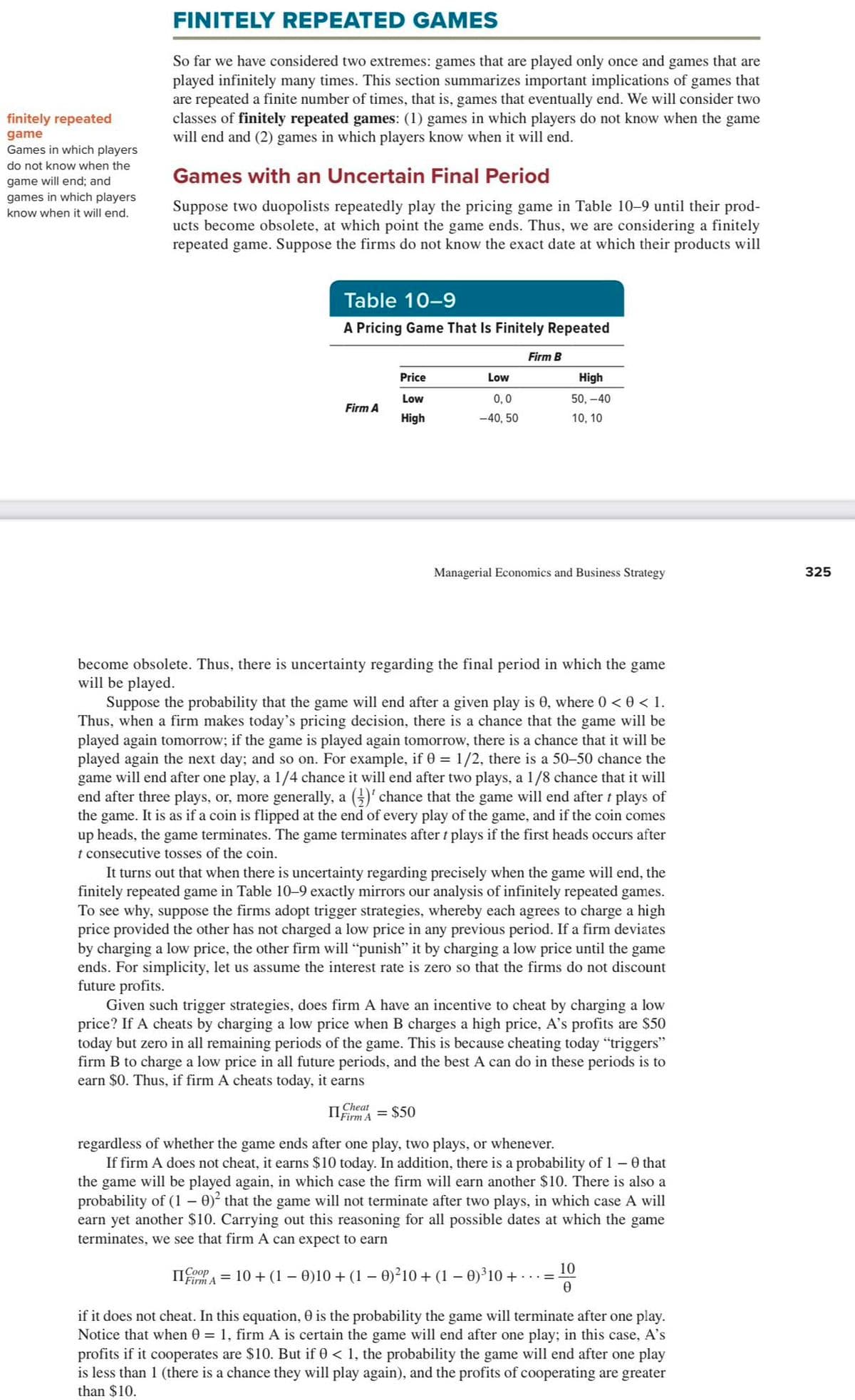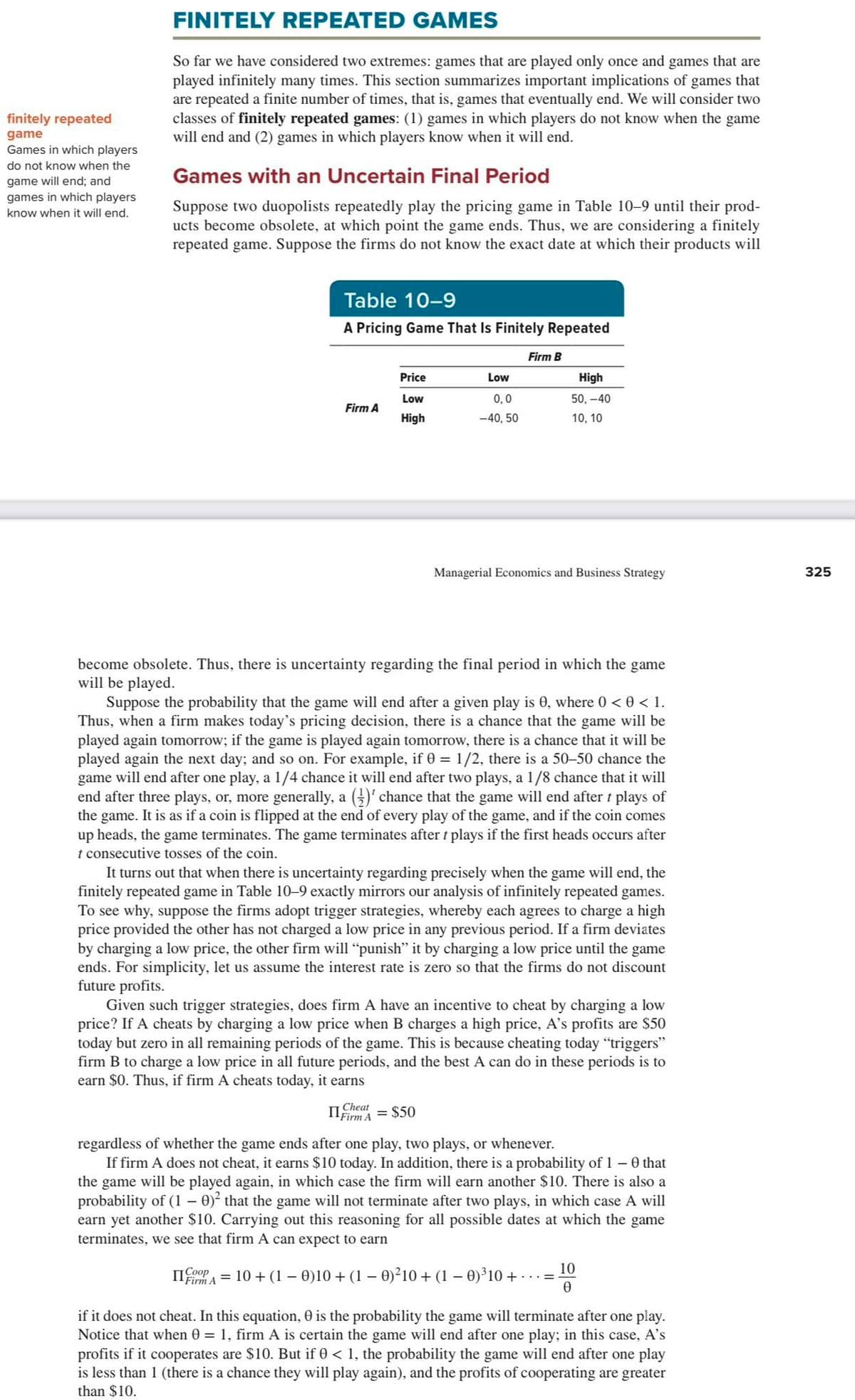Games with an Uncertain Final Period Suppose two duopolists repeatedly play the pricing game in Table 10-9 until their prod- ucts become obsolete, at which point the game ends. Thus, we are considering a finitely repeated game. Suppose the firms do not know the exact date at which their products will
Games with an Uncertain Final Period Suppose two duopolists repeatedly play the pricing game in Table 10-9 until their prod- ucts become obsolete, at which point the game ends. Thus, we are considering a finitely repeated game. Suppose the firms do not know the exact date at which their products will
Chapter8: Game Theory
Section: Chapter Questions
Problem 8.9P
Related questions
Question
Briefly discuss the table and the topic.

Transcribed Image Text:finitely repeated
game
Games in which players
do not know when the
game will end; and
games in which players
know when it will end.
FINITELY REPEATED GAMES
So far we have considered two extremes: games that are played only once and games that are
played infinitely many times. This section summarizes important implications of games that
are repeated a finite number of times, that is, games that eventually end. We will consider two
classes of finitely repeated games: (1) games in which players do not know when the game
will end and (2) games in which players know when it will end.
Games with an Uncertain Final Period
Suppose two duopolists repeatedly play the pricing game in Table 10-9 until their prod-
ucts become obsolete, at which point the game ends. Thus, we are considering a finitely
repeated game. Suppose the firms do not know the exact date at which their products will
Table 10-9
A Pricing Game That Is Finitely Repeated
Firm A
Price
Low
High
Low
0,0
-40, 50
Firm B
High
50,-40
10, 10
Cheat
FirmA = $50
Managerial Economics and Business Strategy
become obsolete. Thus, there is uncertainty regarding the final period in which the game
will be played.
Suppose the probability that the game will end after a given play is 0, where 0 < 0 < 1.
Thus, when a firm makes today's pricing decision, there is a chance that the game will be
played again tomorrow; if the game is played again tomorrow, there is a chance that it will be
played again the next day; and so on. For example, if 0 = 1/2, there is a 50-50 chance the
game will end after one play, a 1/4 chance it will end after two plays, a 1/8 chance that it will
end after three plays, or, more generally, a ()' chance that the game will end after t plays of
the game. It is as if a coin is flipped at the end of every play of the game, and if the coin comes
up heads, the game terminates. The game terminates after t plays if the first heads occurs after
t consecutive tosses of the coin.
It turns out that when there is uncertainty regarding precisely when the game will end, the
finitely repeated game in Table 10-9 exactly mirrors our analysis of infinitely repeated games.
To see why, suppose the firms adopt trigger strategies, whereby each agrees to charge a high
price provided the other has not charged a low price in any previous period. If a firm deviates
by charging a low price, the other firm will "punish" it by charging a low price until the game
ends. For simplicity, let us assume the interest rate is zero so that the firms do not discount
future profits.
Given such trigger strategies, does firm A have an incentive to cheat by charging a low
price? If A cheats by charging a low price when B charges a high price, A's profits are $50
today but zero in all remaining periods of the game. This is because cheating today "triggers"
firm B to charge a low price in all future periods, and the best A can do in these periods is to
earn $0. Thus, if firm A cheats today, it earns
regardless of whether the game ends after one play, two plays, or whenever.
If firm A does not cheat, it earns $10 today. In addition, there is a probability of 1 - 0 that
the game will be played again, in which case the firm will earn another $10. There is also a
probability of (1 - 0)² that the game will not terminate after two plays, in which case A will
earn yet another $10. Carrying out this reasoning for all possible dates at which the game
terminates, we see that firm A can expect to earn
IICOPPA = 10 + (1 - 0)10 + (1 - 0)²10 + (1 - 0)³10 + ..
10
0
if it does not cheat. In this equation, 0 is the probability the game will terminate after one play.
Notice that when 0 = 1, firm A is certain the game will end after one play; in this case, A's
profits if it cooperates are $10. But if 0 < 1, the probability the game will end after one play
is less than 1 (there is a chance they will play again), and the profits of cooperating are greater
than $10.
325

Transcribed Image Text:finitely repeated
game
Games in which players
do not know when the
game will end; and
games in which players
know when it will end.
FINITELY REPEATED GAMES
So far we have considered two extremes: games that are played only once and games that are
played infinitely many times. This section summarizes important implications of games that
are repeated a finite number of times, that is, games that eventually end. We will consider two
classes of finitely repeated games: (1) games in which players do not know when the game
will end and (2) games in which players know when it will end.
Games with an Uncertain Final Period
Suppose two duopolists repeatedly play the pricing game in Table 10-9 until their prod-
ucts become obsolete, at which point the game ends. Thus, we are considering a finitely
repeated game. Suppose the firms do not know the exact date at which their products will
Table 10-9
A Pricing Game That Is Finitely Repeated
Firm A
Price
Low
High
Low
0,0
-40, 50
Firm B
High
50,-40
10, 10
Cheat
FirmA = $50
Managerial Economics and Business Strategy
become obsolete. Thus, there is uncertainty regarding the final period in which the game
will be played.
Suppose the probability that the game will end after a given play is 0, where 0 < 0 < 1.
Thus, when a firm makes today's pricing decision, there is a chance that the game will be
played again tomorrow; if the game is played again tomorrow, there is a chance that it will be
played again the next day; and so on. For example, if 0 = 1/2, there is a 50-50 chance the
game will end after one play, a 1/4 chance it will end after two plays, a 1/8 chance that it will
end after three plays, or, more generally, a ()' chance that the game will end after t plays of
the game. It is as if a coin is flipped at the end of every play of the game, and if the coin comes
up heads, the game terminates. The game terminates after t plays if the first heads occurs after
t consecutive tosses of the coin.
It turns out that when there is uncertainty regarding precisely when the game will end, the
finitely repeated game in Table 10-9 exactly mirrors our analysis of infinitely repeated games.
To see why, suppose the firms adopt trigger strategies, whereby each agrees to charge a high
price provided the other has not charged a low price in any previous period. If a firm deviates
by charging a low price, the other firm will "punish" it by charging a low price until the game
ends. For simplicity, let us assume the interest rate is zero so that the firms do not discount
future profits.
Given such trigger strategies, does firm A have an incentive to cheat by charging a low
price? If A cheats by charging a low price when B charges a high price, A's profits are $50
today but zero in all remaining periods of the game. This is because cheating today "triggers"
firm B to charge a low price in all future periods, and the best A can do in these periods is to
earn $0. Thus, if firm A cheats today, it earns
regardless of whether the game ends after one play, two plays, or whenever.
If firm A does not cheat, it earns $10 today. In addition, there is a probability of 1 - 0 that
the game will be played again, in which case the firm will earn another $10. There is also a
probability of (1 - 0)² that the game will not terminate after two plays, in which case A will
earn yet another $10. Carrying out this reasoning for all possible dates at which the game
terminates, we see that firm A can expect to earn
IICOPPA = 10 + (1 - 0)10 + (1 - 0)²10 + (1 - 0)³10 + ..
10
0
if it does not cheat. In this equation, 0 is the probability the game will terminate after one play.
Notice that when 0 = 1, firm A is certain the game will end after one play; in this case, A's
profits if it cooperates are $10. But if 0 < 1, the probability the game will end after one play
is less than 1 (there is a chance they will play again), and the profits of cooperating are greater
than $10.
325
Expert Solution
This question has been solved!
Explore an expertly crafted, step-by-step solution for a thorough understanding of key concepts.
This is a popular solution!
Trending now
This is a popular solution!
Step by step
Solved in 3 steps

Knowledge Booster
Learn more about
Need a deep-dive on the concept behind this application? Look no further. Learn more about this topic, economics and related others by exploring similar questions and additional content below.Recommended textbooks for you


Managerial Economics: A Problem Solving Approach
Economics
ISBN:
9781337106665
Author:
Luke M. Froeb, Brian T. McCann, Michael R. Ward, Mike Shor
Publisher:
Cengage Learning

Managerial Economics: Applications, Strategies an…
Economics
ISBN:
9781305506381
Author:
James R. McGuigan, R. Charles Moyer, Frederick H.deB. Harris
Publisher:
Cengage Learning


Managerial Economics: A Problem Solving Approach
Economics
ISBN:
9781337106665
Author:
Luke M. Froeb, Brian T. McCann, Michael R. Ward, Mike Shor
Publisher:
Cengage Learning

Managerial Economics: Applications, Strategies an…
Economics
ISBN:
9781305506381
Author:
James R. McGuigan, R. Charles Moyer, Frederick H.deB. Harris
Publisher:
Cengage Learning